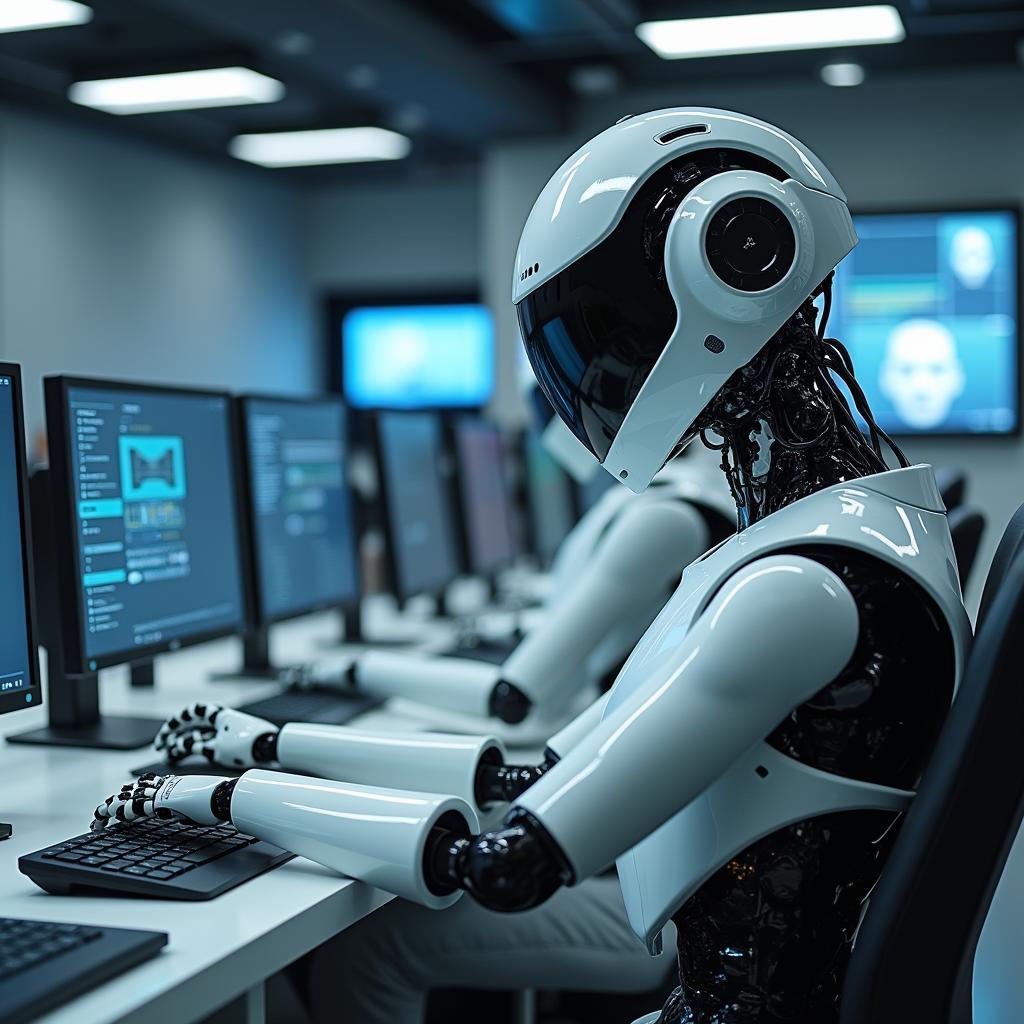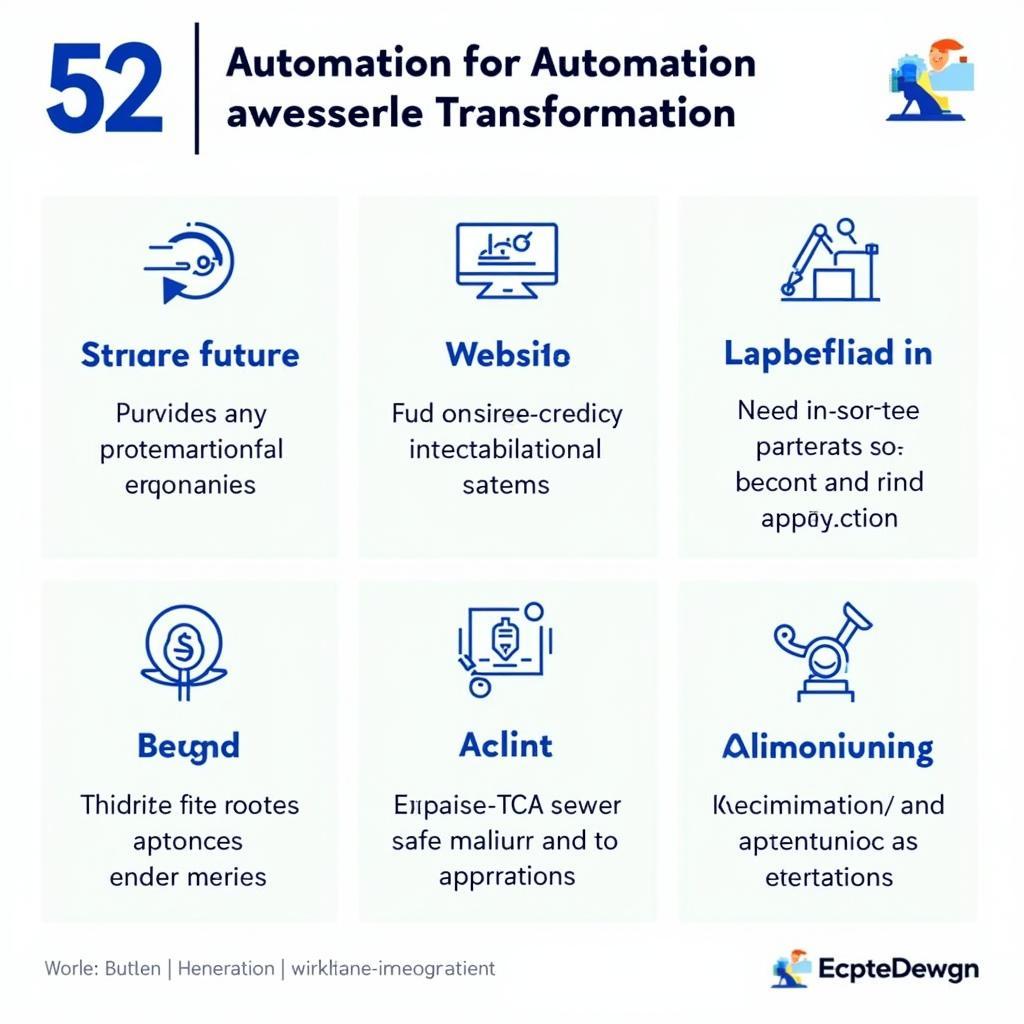The topic of automation and its effects on employment has become increasingly prevalent in IELTS Writing Task 2 examinations. Based on analysis of past papers and current trends, this theme has appeared in various forms, particularly focusing on technological advancement and workplace transformation. Let’s examine a frequently tested question format and provide sample responses across different band scores.
Nội dung bài viết
Question Analysis
Some people believe that the increasing use of automation and artificial intelligence in the workplace will lead to widespread unemployment. Others argue that these technologies will create new job opportunities. Discuss both views and give your opinion.
This question requires candidates to:
- Discuss both positive and negative impacts of automation on employment
- Present balanced arguments
- Provide relevant examples
- State and support a personal position
 The impact of automation and AI on modern workplace dynamics
The impact of automation and AI on modern workplace dynamics
Band 9 Sample Essay
The impact of automation on jobs has become a contentious issue in today’s rapidly evolving workplace. While some fear widespread job losses, others see potential for new employment opportunities. In my opinion, while automation will eliminate certain positions, it will ultimately create more jobs than it displaces.
Those who fear automation point to historical precedents where technological advancement has led to job displacement. For instance, manufacturing sectors have seen significant workforce reductions as robots have replaced human workers on assembly lines. Similarly, how automation is affecting jobs in the service sector is evident in the replacement of bank tellers with ATMs and checkout staff with self-service kiosks.
However, proponents of automation argue that technological progress generates new employment opportunities. The development and maintenance of automated systems require skilled professionals, creating positions for software developers, robotics engineers, and AI specialists. Furthermore, automation of routine tasks allows workers to focus on more complex, creative responsibilities that machines cannot easily replicate.
From my perspective, while the transition may be challenging for some workers, the overall impact of automation will be positive. History shows that technological revolutions, while disruptive, ultimately create more jobs than they eliminate. The key lies in society’s ability to adapt through retraining programs and educational initiatives that prepare workers for emerging roles in the automated economy.
(290 words)
Band 7 Sample Essay
The rise of automation and AI in workplaces has sparked debate about their impact on employment. While some predict job losses, others believe new opportunities will emerge. I think both outcomes will occur, but the positive effects will eventually outweigh the negative ones.
Those concerned about automation argue that many jobs will disappear. For example, AI and automation’s impact on employment can be seen in factories where machines have replaced human workers. Additionally, office jobs like data entry and basic customer service are increasingly being automated.
On the other hand, automation creates new job possibilities. Companies need technicians and engineers to maintain automated systems. The growth of e-commerce has also created many new jobs in logistics and delivery services, despite using automated warehouses.
In my opinion, while some jobs will be lost to automation, new ones will be created. However, workers will need to learn new skills to remain employable. Governments and companies should provide training programs to help people adapt to changing job markets.
(146 words)
Band 6 Sample Essay
Nowadays, many people worry about losing their jobs because of automation and AI. Some think it will cause many people to become unemployed, but others say it will make new jobs. I think both ideas are correct.
First, automation can take away some jobs. In factories, robots do the work instead of people. Also, in shops, self-service machines replace cashiers. This makes some people lose their jobs.
However, new jobs are also created. Companies need people who can fix and control the machines. Also, new types of jobs appear that we didn’t have before, like social media managers and app developers.
I believe automation will change how we work, but not all jobs will disappear. People should learn new skills to work with machines. This way, they can find new jobs when old ones disappear.
(121 words)
Key Vocabulary
- Automation (n) /ˌɔːtəˈmeɪʃən/ – the use of machines and computers to do work that was previously done by people
- Contentious (adj) /kənˈtenʃəs/ – causing or likely to cause disagreement
- Displacement (n) /dɪsˈpleɪsmənt/ – the act of forcing something out of its usual place
- Precedent (n) /ˈpresɪdənt/ – an example from the past
- Proponent (n) /prəˈpəʊnənt/ – a person who supports an idea or theory
 Essential vocabulary for discussing automation and employment
Essential vocabulary for discussing automation and employment
High-scoring Sentence Structures
- Complex Conditional: “If societies fail to prepare for automation through adequate training programs, the transition could lead to significant social challenges.”
- Parallel Structure: “Automation not only increases efficiency but also creates opportunities for innovation and growth.”
- Concession Structure: “While automation may eliminate certain routine jobs, it simultaneously creates new positions requiring higher-level skills.”
Remember to practice these structures and vocabulary in your own writing about how does automation impact the future job market. Share your practice essays in the comments below for feedback and improvement suggestions.


